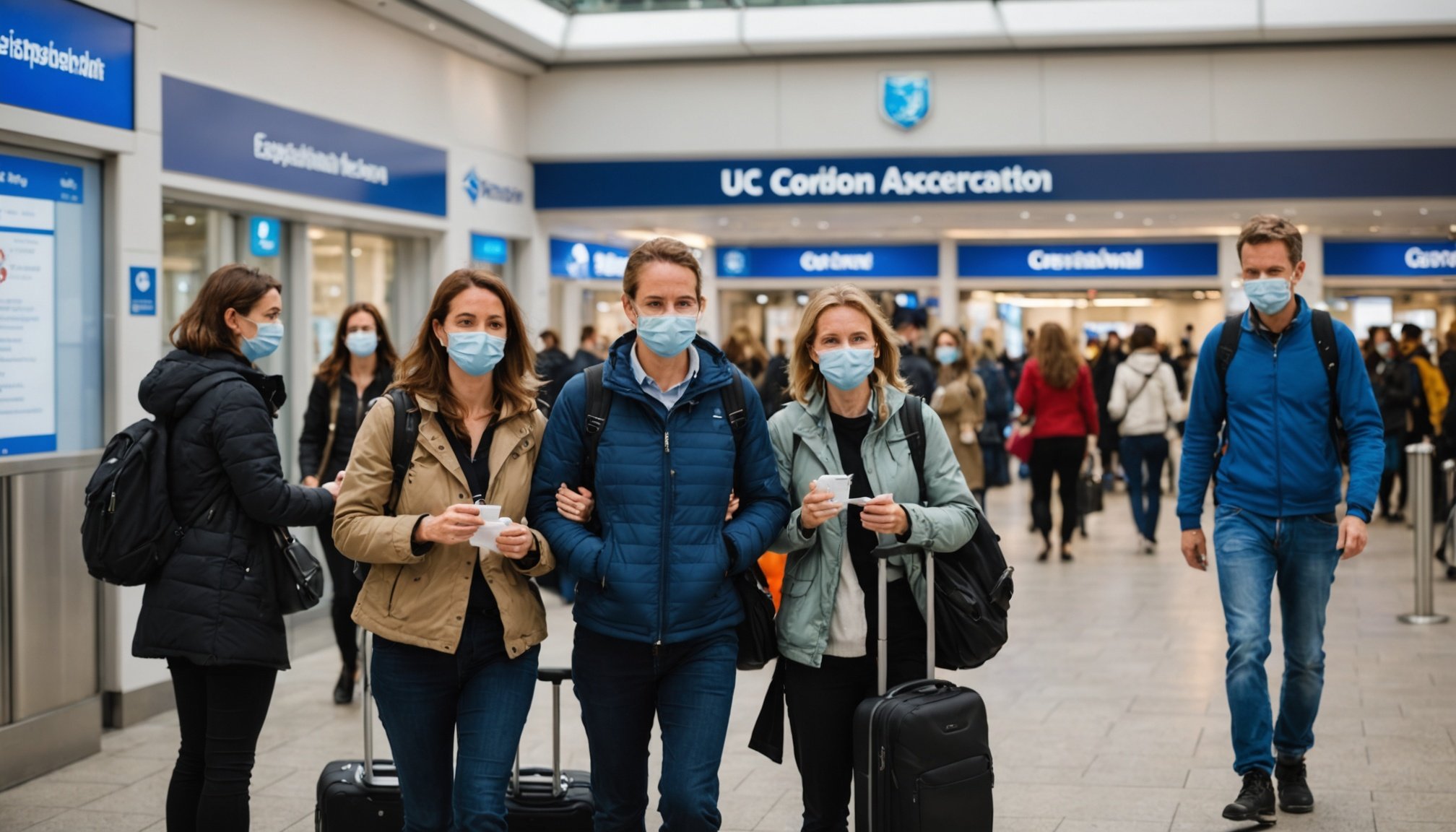Current COVID-19 Vaccination Guidelines for UK Travelers
Staying updated with the COVID-19 vaccination guidelines is critical for UK travelers. As the situation evolves, outbound travelers must be aware of the latest vaccination requirements. These guidelines dictate what is necessary—whether it’s the number of doses or type of vaccine—for international travel.
The UK government recommends that travelers ensure they have received a full course of an approved vaccine. Some destinations might also require a booster shot. This ensures not only personal safety but also compliance with international entry requirements.
Avez-vous vu cela : How the UK Safeguards Consumers from Online Scams in 2023: Essential Protections You Should Know
Understanding the importance of these guidelines can prevent last-minute travel disruptions. Many countries frequently update their entry requirements based on current health data and vaccine availability. Therefore, keeping informed about potential changes is essential.
For the most accurate and reliable information, travelers should always verify details through official health sources, such as the UK government’s travel advisory website or the NHS. These sources provide the essential updates necessary to plan travel without hitches. Knowing where to check official guidelines helps travelers remain compliant and informed.
A découvrir également : Exploring the Effects of the UK”s 2023 Sugar Tax on the Food Sector: A Comprehensive Analysis
Specific Entry Rules by Country
Navigating country-specific entry rules is crucial for travellers in today’s global landscape. The ongoing COVID-19 pandemic has led to diverse travel restrictions that vary by destination and continuously evolve. Understanding these rules can save time and hassle, ensuring a smoother journey.
Popular Destinations and Their Guidelines
Travel restrictions differ significantly among popular destinations. For instance, some countries may require proof of vaccination upon arrival, while others might impose a mandatory quarantine. Travellers need to stay updated on these guidelines, given their dynamic nature. Researching the vaccination requirements for each country is vital, as these rules frequently change.
Unique Rules for High-Risk Areas
Areas identified as high-risk have stricter entry protocols. Countries may demand additional health checks or impose longer quarantine periods for arrivals from these regions. Understanding such country-specific entry rules is crucial while planning travel to high-risk areas.
Comparative Analysis of Entry Requirements
Conducting a comparative analysis of entry requirements across various countries reveals unique patterns. Some nations have relaxed their travel restrictions, focusing primarily on vaccination requirements, while others maintain rigorous regulations to curb COVID-19 spread. This analysis aids travellers in making informed decisions, aligning their plans with current international travel standards.
Potential Exemptions and Special Circumstances
When considering travel, some exemptions cater to individuals unable to meet vaccination requirements. These exemptions can be especially pertinent under special circumstances or health conditions that might preclude traditional compliance.
Travellers may be exempt if they have health conditions preventing vaccination. Conditions such as severe allergies to vaccine components could qualify individuals for an exemption. In these cases, travelers must provide valid medical documentation from a certified health professional, which typically includes a detailed explanation of the condition and why it contraindicates vaccination.
Beyond personal health issues, there are other special circumstances acknowledged. These might include individuals involved in diplomatic missions or certain humanitarian efforts. Each situation might entail different documentation, ensuring the individual’s circumstances are appropriately verified.
To apply for these exemptions, travelers need to submit thorough documentation. This will include medical records, official letters from relevant authorities, or other necessary certifications. It’s crucial for applicants to understand the specific requirements of their exemption category to increase the likelihood of approval. When done correctly, these special circumstances allow travellers to navigate the complexities with greater ease.
Required Documentation for Travel
When travelling, having the right documentation is crucial. Ensuring you have all necessary paperwork can save you from potential headaches at borders and checkpoints.
Types of Accepted Vaccination Proof
In light of the ongoing global pandemic, proving your vaccination status has become a significant part of travel documentation. COVID-19 certificates are widely accepted and are crucial for many destinations. These certificates must clearly show your proof of vaccination, indicating the type of vaccine administered and the dates of vaccination. Depending on your destination, an official vaccination card from your public health authority is generally sufficient. Remember, different countries may have varied requirements, so always verify what is needed for your specific travel location.
Mandatory Health Declarations
Besides proof of vaccination, many countries now require a health declaration upon entry. This usually involves filling out a health questionnaire or declaration form that may ask about recent health conditions or symptoms. Complying with these requirements is critical for entry, as they help mitigate health risks during your travel.
Importance of Digital Copies
For added convenience and security, it’s wise to keep digital copies of all your travel documentation. Scanning and storing these documents on a secure cloud service ensures easy access and prevents loss. Digital copies of COVID-19 certificates and travel documents can simplify procedures, making your travel experience smoother.
Safety Tips While Traveling Abroad
When planning an international trip, travel safety tips are crucial to ensure a smooth and safe experience. During a pandemic, it is vital to stay informed about the local COVID-19 situation in your destination. This requires checking official health advisories and adhering to pandemic travel advice.
Stay updated by following the World Health Organization (WHO) and Centers for Disease Control and Prevention (CDC) for health precautions and alerts. Real-time updates can significantly impact travel plans, ensuring you are aware of any required quarantine measures or entry restrictions.
Adhering to recommended health precautions is essential. These include maintaining social distancing, wearing masks, and practising regular hand hygiene. Additionally, consider health insurance that covers COVID-19-related issues and bring sufficient personal protective equipment (PPE) for your entire stay.
Finding timely health and safety updates is easy with resources like travel websites and embassy updates, which often provide travel advisories. Consistently checking these resources helps travelers make informed decisions, adapting plans to reduce risk.
Travelling internationally during a pandemic necessitates vigilance and preparation. By following these travel safety tips and staying informed, you can enjoy your travels with peace of mind.
Monitoring Changes in Guidelines
Staying updated on health guideline updates is crucial, especially with the ever-evolving landscape of COVID-19. Understanding the best resources and methods to track these updates can help ensure you are prepared and informed.
Recommended Tracking Resources
To keep abreast of the latest COVID-19 travel news, utilize digital platforms that aggregate and summarise updates from multiple sources. Subscribing to reputable news websites and setting up alerts can provide real-time information. Websites like the Centers for Disease Control and Prevention (CDC) offer comprehensive updates and advice relevant to different regions.
Utilizing Government Alerts
Many governments provide alert systems that disseminate crucial updates about travel restrictions and advisories. By subscribing to these government alerts, travellers can receive timely information directly to their devices. This is particularly beneficial for individuals who need to make quick decisions based on changing guidelines.
Following Health Organizations’ Advisories
Health organizations offer critical advisories that reflect the most current expert insights. Following outlets such as the World Health Organization (WHO) ensures access to vetted information regarding global health concerns. These advisories often include practical recommendations that can guide behaviour and travel decisions amid a pandemic. Staying informed leads to safer, more responsible travel choices.











